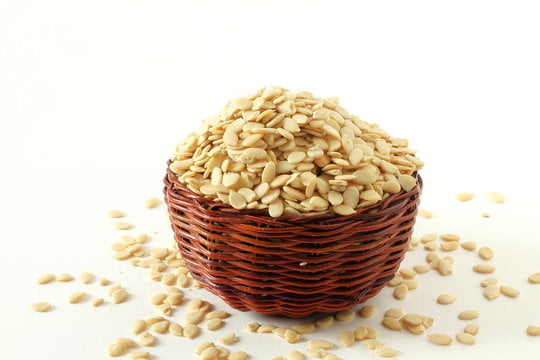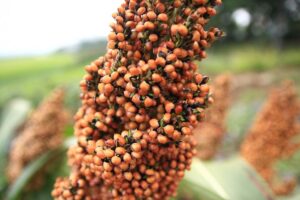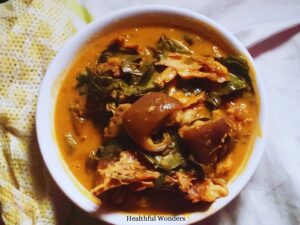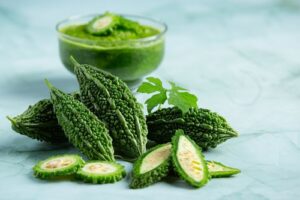Egusi, scientifically called Cucumeropsis mannii is a type of melon native to West and Central Africa.
The plant belongs to the same family as watermelons, Curcurbitaceae, and is also called white seeds melons or egusi-itoo.
Although the fruit and seeds can be eaten, the plant is mostly cultivated for its seeds, which are rich in oil and protein.
The grounded seeds are added to soups and stews to make a popular local delicacy in Nigeria called Egusi soup.
Keep reading to learn the nutrition facts, benefits, and culinary uses of Egusi.
Nutrition facts
Egusi seeds are one of the nutrient-dense varieties of seeds. They are a rich source of proteins, omega 6 fatty acids, calcium, potassium, phosphorus, zinc, copper, and more.
They contain more protein than groundnuts (peanuts) and do not contain any cholesterol.
100 grams of African egusi seeds will provide you with:
- Calories: 593 calories
- Carbohydrates: 8 grams (g)
- Fats: 52 g
- Protein: 31 g
- Fiber: 3 g
- Calcium: 75 milligrams (mg)
- Iron: 6 mg
- Zinc: 4 mg
- Potassium: 601 mg
- Phosphorus: 827 mg
- Magnesium: 359 mg
- Vitamin E: 1 mg
- Vitamin A: <66.1 IU
The seeds are also good sources of B-vitamins, vitamin C, copper, and selenium.
Health benefits of Egusi seeds
The following are the possible health benefits of adding egusi to your diet
1. Rich in antioxidants
Antioxidants are substances that fight against disease-causing free radicals in the body.
African melon seeds (egusi) are rich in zinc, selenium, copper, and vitamin E and A – important antioxidants that help prevent cell damage and boost immunity.
The rich antioxidant content of egusi is also beneficial in preventing metabolic diseases like cancer, diabetes, and heart disease.
2. Rich in protein
Egusi seeds are incredibly rich in protein and contain all the essential amino acids needed for the growth and development of body cells.
The seeds are rich in the 9 essential amino acids that cannot be made by the body and must be obtained from your diet.
They include histidine, isoleucine, leucine, lysine, methionine, phenylalanine, threonine, tryptophan, and valine.
Eating a diet rich in egusi can provide a healthy source of plant protein for vegans and growing children in developing countries.
3. Rich in healthy fats
African melon seeds are a good source of essential fatty acids like omega-6 fatty acids (linoleic acid) that cannot be produced in the body.
Studies found that egusi oil contains – palmitic acid(10.27%), stearic acid (10.26%), oleic acid (15.90%), and linoleic acid. (62.42%).
These fatty acids are classified under monounsaturated and polyunsaturated fatty acids and are useful in disease prevention.
4. Prevents heart disease
The omega 6 fatty acids found in high amounts in egusi may help to prevent heart attacks, lower high blood pressure, and lower levels of bad (LDL) cholesterol.
Additionally, egusi seeds contain potassium and other minerals that protect heart function and reduce the risk of high blood pressure.
5. Prevents osteoporosis
Egusi seeds are good sources of calcium, magnesium, and phosphorus – three minerals that promote bone growth, improve muscle function, and prevent demineralization of bone cells.
Hence, eating a diet rich in African melon seeds will help to prevent osteoporosis, a condition that causes weakening and breaking of bones.
6. Prevents malnutrition
Substituting egusi seeds with meat will provide a cheap source of healthy protein for children and adults in developing countries.
In some cultures, egusi juice serves as supplementary food for babies when breast milk is unavailable.
A diet rich in egusi and other plant proteins like locust beans will help prevent anemia and boost healthy growth.
7. Boosts immunity
Eating egusi provides your body with a rich supply of essential fatty acids that support the body in producing prostaglandins.
Prostaglandins are lipid hormone-like substances that aid blood clotting, regulate infections, and encourage the body to fight infections.
Thus, incorporating egusi into your diet will ensure that your body is provided with all it needs to stay healthy and fight infections.
8. Great for skin health
Egusi seed oil contains antioxidants like vitamin E that helps to moisturize the skin, reduce dullness, and fight signs of early aging.
You can apply the oil directly to your skin or add the ground or toasted seeds into your diet.
Also read: Palm Kernel Oil: Amazing benefits for hair, skin, and health
9. Great for hair health
African melon seeds are good sources of protein, magnesium, and copper, which help maintain healthy hair.
Protein boosts hair growth, magnesium prevents split ends and breakage, while copper boosts melanin production.
10. Great for pregnancy
Pregnant women need a healthy diet that is rich in protein, fats, vitamins, and minerals to help boost their immunity and prevent fetal abnormalities.
Adding egusi as part of a healthy diet will help provide all the essential nutrients needed by the baby and mother.
Also read: Can eating Dates help Induce Labor? Benefits and Side Effects
Culinary uses of Egusi seeds
The seeds are highly versatile and are useful in soups, snacks, smoothies, and oil production.
Egusi soup
This soup is a local delicacy that can be eaten with fufu or rice in Nigeria, Ghana, and Cameroon. Meat, palm oil, and fresh vegetables are often added to bulk up the soup and increase its nutrient content.
To harvest the seeds, the ripe egusi melons are left to ferment for 7- 10 days to allow easy removal of the seeds. After fermentation, the seeds are scooped out, washed, dried, and peeled to reveal the soft fleshy interior.
This fleshy interior is then grounded in a mill or blender into a fine powder that is used in making the soup.
Luckily, in most local African markets, you can find the already processed egusi powder.
How to cook egusi
Ingredients:
- 1 cup blended melon seeds
- ½ kg chicken, turkey, or beef
- 2 medium-sized smoked fish
- 2 tablespoon ground crayfish
- 1 tablespoon palm oil
- 1 bunch pumpkin leaves (ugu), spinach, or Uziza leaves
- 2 seasoning cubes
- 1 medium-sized onions
- 2 medium-sized habanero peppers or chilies
- 3 cups water
- 3 medium-sized plum tomatoes (optional)
- 1 tablespoon locust beans (optional)
- Salt to taste
Directions:
- Add melon seeds, peppers, tomatoes, onion, and little water to a blender. Blend ingredients together to form a thick paste.
- In a large pot, add chopped chicken or beef, crayfish, smoked fish, palm oil, locust beans, and water. Bring to a boil for 15 minutes, or until meat is completely cooked.
- Then scoop little bits of the egusi paste into the pot. Do not stir in the mixture, simply cover the pot and allow cooking for 10 minutes.
- Finally, add the veggies, mix them, and allow cooking for an extra 5 minutes. When you notice that the oil is starting to rise to the top, your egusi Soup is ready.
- Serve with rice or any fufu of your choice.
Toasted snack
Just like pumpkin seeds, you can toast your egusi seeds and sprinkle them into your salads, baked goods, or just snack on them.
To prepare toasted melon seeds, season the peeled seeds with salt. Then spread them on a baking tray and bake at 400 °F for 5 minutes or until they begin to brown.
If you don’t have an oven, you can simply toast the seeds in a pan on low heat until they are slightly browned.
Egusi smoothie
This drink is very nutritious and filling. To prepare it, blend slightly boiled or toasted egusi seeds with water, honey, or bananas.
It produces a milky-like smoothie that is used as a breast milk substitute in some cultures. However, if you are making the drink for babies under a year, please do not add honey.
Egusi seed oil
From egusi seeds, you can extract a healthy oil that is used in cooking, cream making, and soap manufacture.
The oil is extracted by pressing or pounding the dried seeds in a mill or mortar.
The bottom line
Egusi (African melon seed) is a healthy seed that provides you with protein, healthy fats, carbs, vitamins, minerals, and antioxidants.
The seeds contain more protein than peanuts and are effective in preventing heart disease, osteoporosis, malnutrition, and infections.
They are also versatile and easy to include in several delicious recipes. So start relishing it today!
Did you find this article helpful? Please leave your comments below!
- Samuel A. et al. Evaluation of nutrient composition of African melon oilseed (Cucumeropsis mannii Naudin) for human nutrition. 2011 academicjournals.org/journal/IJNAM/article-full-text-pdf
- Aloho, P. et al. The Quality of ‘ Egusi-Itoo ’ Melon ( Cucumeropsis Mannii Naudin . ) Seed Harvested at Different Fruit Ages.” 2012. .semanticscholar.org/paper/The-Quality-of-African-Melon
- Wikipedia: wikipedia.org/wiki/Cucumeropsis_mannii
- Ileola O. et al. Biochemical and Microbiological Evaluation of the Effect of Processing on Cucumeropsis mannii Seed A. 2020. doi.org/10.9734/ijbcrr/2020/v29i530187
- Tropical Plants Database, Ken Fern. tropical.theferns.info. 2021-08-27. tropical.theferns.info/viewtropical.Cucumeropsis+mannii
- Akobundu E. et al. Chemical, Functional, and Nutritional Properties of Egusi (Colocynthis citrullus L.) Seed Protein Products. 1982 onlinelibrary.wiley.com/doi/pdf
Get new free and exclusive health tips delivered straight to your inbox!




